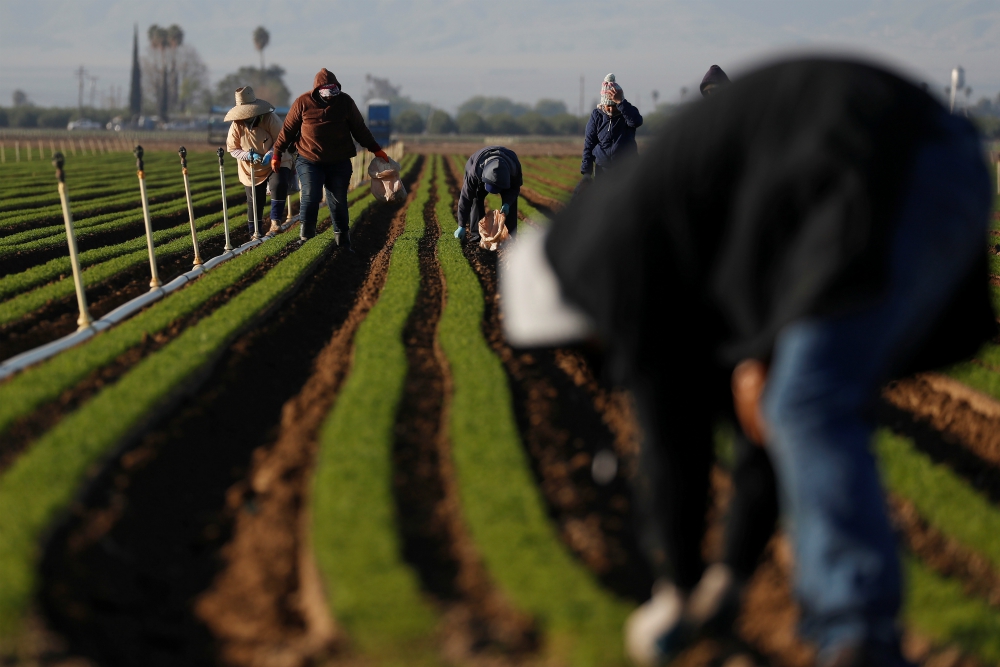
Agricultural workers in Arvin, California, clean carrot crops April 3, during the coronavirus pandemic. (CNS/Reuters/Shannon Stapleton)
Last Sunday's Gospel seems rich in its simplicity and invitation: "Come to me, all you who labor and are burdened, and I will give you rest."
Let us not be fooled. Although Jesus' words can conveniently be used for just about anyone who appears tired, this invitation specifically comes after a chapter of teaching his disciples how to be apostles, people sent out on a mission. They are instructed to go to the "lost sheep of the house of Israel" (Matthew 10:6). They are instructed to "be shrewd as serpents and simple as doves," because "I am sending you like sheep in the midst of wolves" (Matthew 10:16).
He continues, "When they persecute you in one town, flee to another" (Matthew 10:23). "And do not be afraid of those who kill the body but cannot kill the soul" (Matthew 10:28).
Jesus' invitation is more than just a "come and follow me." Jesus invites us to learn from him, so that we will live moments that are life-giving in this loved and loving community with the One who sent me and the One who is also an advocate. Jesus' invitation is to live in the fullness of God's reign now and later.
This instruction seems to be in contradiction with the current church's message of who can pray and be community together or even deserves full human rights in the workplace.
Lutheran theologian Elisabeth Johnson writes:
The religious leaders in Matthew's story are also complicit with the Roman rulers in maintaining the imperial system. The common people labor wearily under Roman occupation, in which the ruling elite secure wealth, status, and power at the expense of the lowly. Jesus rejects this social order as contrary to God's will: "You know that the rulers of the Gentiles lord it over them, and their great ones are tyrants over them. It will not be so among you; but whoever wishes to be great among you must be your servant, and whoever wishes to be first among you must be your slave; just as the Son of Man came not to be served but to serve, and to give his life a ransom for many" [Matthew 20:25-28].
Advertisement
Since Jesus is the way, the truth, and the life (John 14:6), he reassures people that he is "meek and humble of heart." Because he is humble, his teaching is light. His teaching may not be easy or without consequence, but it is light nonetheless. His manner is humble and his teaching is light.
This lightness is true because he shares in carrying the load with us all. The burden of loving, especially the least of these, is shared by others, including Jesus, and that's why this burden becomes light.
I once heard humility being described as standing in the light of your truth. Phillips Brooks, who wrote the lyrics to the Christmas hymn "O Little Town of Bethlehem," is quoted as saying, "The true way to be humble is not to stoop until you are smaller than yourself, but to stand at your real height against some higher nature that will show you what the real smallness of your greatness is."
Jesus' approach to proclaiming God's reign is beyond self-absorption, embraces a larger complexity of relationship and power, and resists the temptation to exaggerate his importance. Brooks' manner of humility applies to Jesus' way of loving, teaching, challenging, inviting, consoling, caring.
Our society and presumptive and emerging "leaders" place heavy burdens on many of us, but especially on those who may not fit into the dominant heteronormative, able-bodied, speak-English-only, respectability-politicking boxes that our imperialist, white-supremacist, capitalist patriarchy (bell hooks) privileges and prioritizes. Many Brown and Black, gay, transgender essential workers are the common people whose labor we depend on. Jesus cautions us against religious leaders who place the weight and burden of oppression and slavery upon their backs.
Jesus challenges this social order and invites all of us who are weighed down by the burdens imposed upon us. He invites us to rest. This rest (in Greek, anapausis can refer to rest as death, as Sabbath, or as an end to war) points to an end of reality as we know it. God continues the story in a new way, refreshed, renewed, re-organized and enlivened.
God calls us all, especially those who are laboring within a system that dehumanizes them, ignores them, takes advantage of them, even kills them. It's just us. We are the JUST us, or the justice, Jesus calls and invites into rest and friendship.
Come to me, all you who labor and are burdened, and I will give you rest. Take my yoke upon you and learn from me, for I am meek and humble of heart; and you will find rest for yourselves. For my yoke is easy, and my burden light.
[Jocelyn A. Sideco is a retreat leader, spiritual director and innovative minister who specializes in mission-centered ministry. Visit her online ecumenical ministry, In Good Company or email her at jocelyn@ingoodcompany.net.co.]
Editor's note: Sign up here and we can send you a note every time a Young Voices column is posted to NCRonline.org so you won't miss any.







